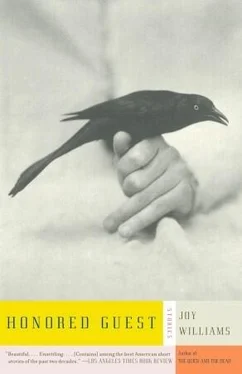Deke had casually resumed his litany of the inadequacies of Angela’s method of living. “Carpeting not particularly clean — gritty, in fact. No handy cold-care tissues available, no Proust.”
“For godssakes,” Darleen said, “you’re the biggest show-off I’ve ever known for someone who a couple hours ago was begging outside the bus station.”
“Selling newspapers,” Deke said.
“They were giveaway papers,” Darleen said. “They were supposed to be free.” She turned to her mother. “I was kind of not looking forward to us being together. I needed a respite from you at first. So I gave this one fifty dollars to come here with me.”
“You want it back?” From a slit pocket in his shirt he extracted a bill, then proceeded to unfold Benjamin Franklin’s enormous head.
“Yes, she does,” Angela said. “Of course she does.” She sent Darleen a hundred dollars every month for, the word they had agreed upon was incidentals , and she certainly did not want her to be disposing of the money in this fashion. “I send you a hundred—”
“Big goddamn deal,” Darleen said. “My roommate gets two hundred each month from her parents, which they earn by collecting cans and bottles. The Garcias search the streets and alleys thirteen hours a day for cans and bottles. It’s their goddamn job. Fifteen thousand cans pay their rent each month and another six thousand nets their little scholar Isabelle two hundred bucks each month, and I am informing you that Isabelle — who’s the biggest goddamn snob I’ve ever met — spends it on fancy underwear. The Garcias are tiny, selfless, worn-out saints walking the earth, I’ve seen ’em, and Isabelle buys lingerie.” She waved the proffered bill away. “What’s gone is gone,” she said, and laughed.
Deke refolded the bill and placed it back in his shirt. “She’s probably referring to an unfortunate erotic crisis I underwent recently. Otherwise, given its more general application, I would say that she doesn’t subscribe to the gone-is-gone theory one bit.”
Darleen scowled at him. “This is not the appropriate moment.”
Deke sniffed loudly, rotated his arms and clasped his hands together. “Cold in here too. Not cozy. Only thing of interest is this old painting. Where’d you get this? Quite out of place. An odd choice, I’d say.”
It was a large oil of beavers and their home on a lake, painted the century before. It was not in a frame but affixed to the wall by nails. Angela looked at it, resting her chin in her hand thoughtfully. The colors of the landscape were deep and lustrous. The water was a fervent rumpled barren of green, the trees along the curving shore like cloaked messengers. Everything seemed fresh and clean with kind portent, even the sky. God had poured his being in equal measure to all creatures, Angela thought solemnly, to each as much as it could receive. Beavers were peculiar and reclusive, but that was their nature. They were not frivolous beings. They behaved responsibly and gravely and with great fidelity. Here they were involved in the process of constructing their house, carrying branches and twigs and so forth in their jaws and on their great paddle-like tails, though the structure was already large and in Angela’s view extremely accomplished, a mansion, in fact, the floors of which were carpeted with boughs of softest evergreen, the windows curving out over the water like balconies for the enjoyment of the air.
“Mummy stole that painting,” Darleen said.
“Well, good for you!” Deke said. Clearly, Angela had been elevated in his regard.
“Some years ago, Mummy used to be quite the drinker,” Darleen said.
“Is that so!” Deke exclaimed, more delighted still. “Why’d you give it up?”
The painting had been in a roadhouse she once frequented. Sitting and drinking, pretty much alone in that unpopular place, she would watch the painting with all her heart. Slowly her heavy heart would turn light and she would feel it pulling away as though it wasn’t responsible for her anymore, freeing her to slip beneath the glittering skein of water into the lovely clear beaver world of woven light where everything was wild and orderly and real. A radiant inhuman world of speechless grace. This was where she spent her time when she could. These were delicate moments, however, and further weak cocktails never prolonged them. Further cocktails, actually, no matter how responsibly weak, only propelled her to the infelicitous surface again. The artist, the bastard, had probably trapped and drowned the beavers and thrust rods through their poor bodies to arrange them in life-assuming positions, as Audubon had done with birds, the bastard, and Stubbs had done with horses, the bastard, to make his handsome portraits.
“Your mother isn’t very forthcoming with the details, is she?” Deke said.
“I would wake up weeping,” Angela said. “Tears would be streaming down my face.”
“You quit, and now they don’t anymore?” Deke asked suspiciously.
Angela stared at him.
“Doesn’t seem much to give up the drink for, a few tears. How long’s it been since you’ve cried now?”
“Oh, years,” Angela said.
“And now her heart’s a little ice-filled crack. Isn’t it, Mummy?” Darleen said.
“Why don’t you leave your mother alone for a while,” Deke said. “Look at you. You’re a vicious little being, like one of those thylacines.”
“The Tasmanian wolf is extinct,” Darleen said. “Don’t show off so goddamn much.”
“Their prey was sheeps,” Deke said. “But the sheeps won out in the end. They always do.”
“Sheeps,” Darleen snickered.
“A vicious little being you are,” Deke repeated mildly. He regarded the painting once more. “I got a friend knew a guy who lived with a beaver in the Adirondacks. Every time my friend would go visit him, that beaver would be there with its own big beaver house made of sticks and such right in this guy’s cabin. He’d rescued this beaver and they had a really good relationship. You broke bread with my friend’s friend and you’d break bread with that beaver.”
“Mummy, when do you plan on serving supper?” Darleen said. “She never has food in this house,” she said to Deke.
“She’s got a number of vegetables ready to go. Vegetables are good for you,” he said without much conviction.
At dinner, Angela felt impelled to ask him how he and Darleen had met and what, exactly, it was that he did.
“This is what I got to say to that remark. I don’t know if you read much, but there’s a story by Anton Chekhov called ‘Gooseberries.’ And in this story one of the characters says in conversation that there should be a man with a hammer reminding every happy, contented individual that they’re not going to be happy forever. This man with a hammer should be banging on the door of the happy individual’s house or something to that effect.”
“You think you’re the man with the hammer?”
Deke smiled at her modestly.
“If I recall that story correctly,” Angela said, “the point being made about the man with the hammer is that there is no such person.” Angela had attended boarding school herself. She remembered almost everything she had been alerted to then and very little afterwards.
“You’re so negative, Mummy. You dispute anything anyone has to say,” Darleen crouched over the table with her fist wrapped around a fork, not eating.
“The man with the hammer that I recall is in another story, not by Chekhov at all. In A Mother’s Tale the circumstances couldn’t be more …”
“Don’t be tiresome, Mummy,” Darleen said.
“Why don’t you leave your mother alone, the poor woman,” Deke said. “This is an ordinary woman here. Where’s the challenge? Why do you hate her so much? Your hate’s misplaced, I’d say.”
Читать дальше












